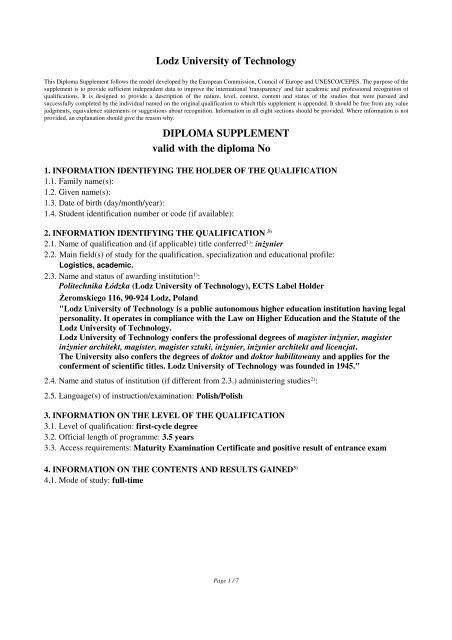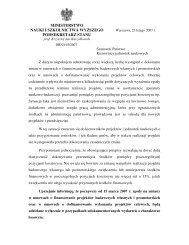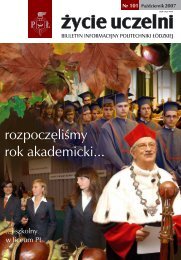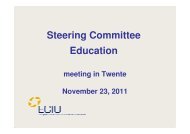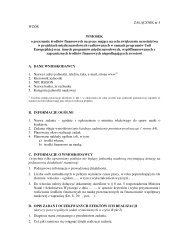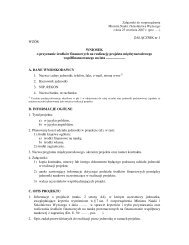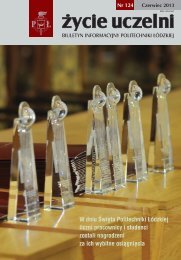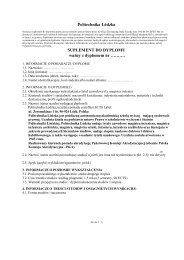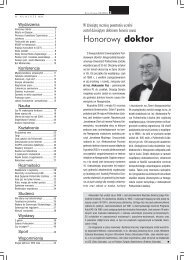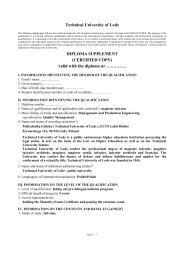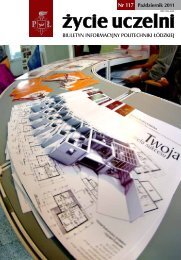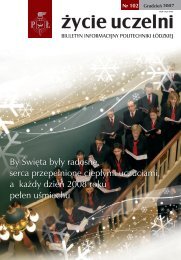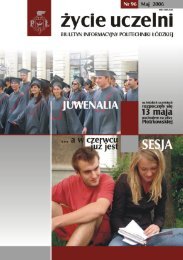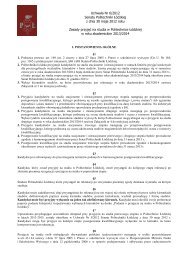Lodz University of Technology DIPLOMA SUPPLEMENT valid with ...
Lodz University of Technology DIPLOMA SUPPLEMENT valid with ...
Lodz University of Technology DIPLOMA SUPPLEMENT valid with ...
Create successful ePaper yourself
Turn your PDF publications into a flip-book with our unique Google optimized e-Paper software.
<strong>Lodz</strong> <strong>University</strong> <strong>of</strong> <strong>Technology</strong><br />
This Diploma Supplement follows the model developed by the European Commission, Council <strong>of</strong> Europe and UNESCO/CEPES. The purpose <strong>of</strong> the<br />
supplement is to provide sufficient independent data to improve the international 'transparency' and fair academic and pr<strong>of</strong>essional recognition <strong>of</strong><br />
qualifications. It is designed to provide a description <strong>of</strong> the nature, level, context, content and status <strong>of</strong> the studies that were pursued and<br />
successfully completed by the individual named on the original qualification to which this supplement is appended. It should be free from any value<br />
judgments, equivalence statements or suggestions about recognition. Information in all eight sections should be provided. Where information is not<br />
provided, an explanation should give the reason why.<br />
<strong>DIPLOMA</strong> <strong>SUPPLEMENT</strong><br />
<strong>valid</strong> <strong>with</strong> the diploma No 88245<br />
1. INFORMATION IDENTIFYING THE HOLDER OF THE QUALIFICATION<br />
1.1. Family name(s): Kosiur<br />
1.2. Given name(s): Karolina<br />
1.3. Date <strong>of</strong> birth (day/month/year): 14.08.1989<br />
1.4. Student identification number or code (if available): 151077<br />
2. INFORMATION IDENTIFYING THE QUALIFICATION 3)<br />
2.1. Name <strong>of</strong> qualification and (if applicable) title conferred 1) : inżynier<br />
2.2. Main field(s) <strong>of</strong> study for the qualification, specialization and educational pr<strong>of</strong>ile:<br />
Logistics, academic.<br />
2.3. Name and status <strong>of</strong> awarding institution 1) :<br />
Politechnika Łódzka (<strong>Lodz</strong> <strong>University</strong> <strong>of</strong> <strong>Technology</strong>), ECTS Label Holder<br />
Żeromskiego 116, 90-924 <strong>Lodz</strong>, Poland<br />
"<strong>Lodz</strong> <strong>University</strong> <strong>of</strong> <strong>Technology</strong> is a public autonomous higher education institution having legal<br />
personality. It operates in compliance <strong>with</strong> the Law on Higher Education and the Statute <strong>of</strong> the<br />
<strong>Lodz</strong> <strong>University</strong> <strong>of</strong> <strong>Technology</strong>.<br />
<strong>Lodz</strong> <strong>University</strong> <strong>of</strong> <strong>Technology</strong> confers the pr<strong>of</strong>essional degrees <strong>of</strong> magister inżynier, magister<br />
inżynier architekt, magister, magister sztuki, inżynier, inżynier architekt and licencjat.<br />
The <strong>University</strong> also confers the degrees <strong>of</strong> doktor and doktor habilitowany and applies for the<br />
conferment <strong>of</strong> scientific titles. <strong>Lodz</strong> <strong>University</strong> <strong>of</strong> <strong>Technology</strong> was founded in 1945."<br />
2.4. Name and status <strong>of</strong> institution (if different from 2.3.) administering studies 2) :<br />
2.5. Language(s) <strong>of</strong> instruction/examination: Polish/Polish<br />
3. INFORMATION ON THE LEVEL OF THE QUALIFICATION<br />
3.1. Level <strong>of</strong> qualification: first-cycle degree<br />
3.2. Official length <strong>of</strong> programme: 3.5 years<br />
3.3. Access requirements: Maturity Examination Certificate and positive result <strong>of</strong> entrance exam<br />
4. INFORMATION ON THE CONTENTS AND RESULTS GAINED 3)<br />
4.1. Mode <strong>of</strong> study: full-time<br />
Page 1 / 7
4.2. Programme requirements:<br />
The duration <strong>of</strong> the degree course may not be shorter than 7 semesters. The number <strong>of</strong> class hours may not be lower<br />
than 2400. The number <strong>of</strong> ECTS (European Credit Transfer and Accumulation System) awarded may not be lower<br />
than 210. The total number <strong>of</strong> class hours required in the curriculum <strong>of</strong> part-time studies amounts to 0.6 <strong>of</strong> the<br />
minimum number <strong>of</strong> class hours defined in the standards <strong>of</strong> education, however, the contents defined in the standards<br />
must be fully covered.<br />
The graduate will have acquired knowledge and skills <strong>with</strong>in the field <strong>of</strong> functioning <strong>of</strong> modern logistics systems and<br />
the basis <strong>of</strong> comic sciences, organization and management and possesses managerial abilities. S/he possesses<br />
abilities to solve logistics problems by means <strong>of</strong> methods and engineering techniques and in this field: design <strong>of</strong><br />
logistics systems and logistics processes, the management <strong>of</strong> specific logistic functions and logistics processes, the<br />
usage <strong>of</strong> computer systems to support logistic management, costs management, finances and recruitment <strong>of</strong><br />
personnel and training. The graduate will have been prepared to undertake employment in enterprises engaged in<br />
production, logistics, research and consultancy units dealing <strong>with</strong> logistics, administration and all other companies<br />
where logistics, technical, economical and computer knowledge as well as organizational abilities are required.<br />
The graduate <strong>of</strong> the first-cycle studies should have acquired foreign language pr<strong>of</strong>iciency at the B2 level according<br />
to the Common European Framework <strong>of</strong> Reference for Languages (CEFR) <strong>of</strong> the Council <strong>of</strong> Europe and has a<br />
command <strong>of</strong> the specialized terminology used <strong>with</strong>in the field <strong>of</strong> study pursued. (English is recommended as the<br />
language <strong>of</strong> choice). The graduate will have been prepared to continue studies on a second-cycle degree program.<br />
The degree program must include at least 405 hours <strong>of</strong> the core content courses (42 ECTS) in the fields <strong>of</strong>:<br />
mathematics, statistics, management, systems engineering and systems analysis, physics and chemistry, economy,<br />
marketing, finances and accountability, law, pr<strong>of</strong>essional ethics, knowledge <strong>of</strong> materials, product research and at<br />
least 360 hours (38 ECTS) <strong>of</strong> specialized courses in the fields <strong>of</strong>: production management and services, logistics and<br />
management <strong>of</strong> supplies chain, logistics infrastructure, supply logistics, production logistics, distribution logistics,<br />
normalization and management <strong>of</strong> quality in logistics, distribution logistics, normalization and quality management,<br />
economics and process design.<br />
The degree course curriculum must include at least 60 hours <strong>of</strong> courses in the field <strong>of</strong> sports, for which 2 ECTS<br />
points may be awarded, and at least 120 hours <strong>of</strong> foreign language courses, for which 5 ECTS points must be<br />
awarded. Information <strong>Technology</strong> course (30 hours) content, namely, basis <strong>of</strong> Information <strong>Technology</strong>, wordprocessing,<br />
spreadsheets, databases, managerial and/or presentation graphics, information network services, data<br />
mining and processing, must constitute a properly selected subset <strong>of</strong> the information contained in the modules<br />
required to obtain the European Computer Driving License (ECDL). Moreover, the degree course curriculum must<br />
include at least 60 hours <strong>of</strong> arts and humanities content (3 ECTS), courses on intellectual property rights, work<br />
safety and hygiene and ergonomics courses. The first-cycle degree course curriculum must include at least a fourweek<br />
placement.<br />
Seminars, tutorials, projects and laboratories should account for at least 50% <strong>of</strong> all classes.<br />
15 ECTS points are awarded for the first-cycle diploma ("inżynier" degree project) and final examination<br />
preparation.<br />
Page 2 / 7
4.3. Programme details (e.g. modules or units studied), and the individual grades/marks/credits obtained.<br />
Form <strong>of</strong> classes: L - lecture, T - tutorial, Lab - laboratory, P - project, S - seminar, O - other<br />
Semesters: S - summer semester, W- winter semester<br />
Academic<br />
year<br />
Code<br />
Course title<br />
Number <strong>of</strong> hours<br />
L T Lab P S<br />
O<br />
ECTS<br />
credits<br />
Grade<br />
2008/09 W 0711511000 Basics <strong>of</strong> Algorithms 30 30 - - - - 4 3.5<br />
2008/09 W 0715000400 Industrial Safety - - - - - - 0 pass<br />
2008/09 W 0711111000 Information Technologies - - 30 - - - 2 3.5<br />
2008/09 W 0711213000 Introduction to Mathematical Analysis - 30 - - - - 2 3<br />
2008/09 W 0905111000 Law 30 - - - - - 3 3.5<br />
2008/09 W 0711214000 Mathematics I 30 15 - - - - 4 3<br />
2008/09 W 0711211000 Physics 30 - 30 - - - 4 4<br />
2008/09 W 0771014000 Theoretical Foundations <strong>of</strong> Computer Science 30 - - - - - 3 3<br />
2008/09 S 0711226000 Basics <strong>of</strong> Commodity Science 15 15 - - - - 4 4.5<br />
2008/09 S 0711223000 Finance and Accounting 15 15 - - - - 2 3<br />
2008/09 S 2291000021 Foreign Language: English m. 2.1 - 30 - - - - 1 3<br />
2008/09 S 0711221000 Introduction to Programming 30 - 30 - - - 4 3<br />
2008/09 S 0711225000 Makroeconomics 15 15 - - - - 4 3.5<br />
2008/09 S 0905112000 Management 30 15 - - - - 4 3<br />
2008/09 S 0711224000 Mathematics II 30 15 - - - - 4 3.5<br />
2008/09 S 0711212000 Microeconomics 15 15 - - - - 4 3<br />
2008/09 S 0771026000 Operating Systems 30 - 30 - - - 6 3<br />
2008/09 S 0905114000 Pr<strong>of</strong>essional Ethics 30 - - - - - 3 4<br />
2008/09 S 2392000021 Sport - 30 - - - - 0 pass<br />
2008/09 S 0711222000 Supply Logistics 30 15 - - - - 4 4.5<br />
2009/10 W 2291122201 Foreign Language: English m. 3.1 - 30 - - - - 1 3.5<br />
2009/10 W 2291122301 Foreign Language: English m. 3.2 - 30 - - - - 1 3<br />
2009/10 W 0711533000 Introduction to Database Systems 30 - 30 - - - 5 3<br />
2009/10 W 0711531000 Object-Oriented Programing in C++ 30 - 30 - - - 5 3.5<br />
2009/10 W 0711232000 Product Determination in Logistics 15 15 - - - - 3 4<br />
2009/10 W 0905116000 Production and Services Management 30 15 - - - - 3 4<br />
2009/10 W 0711331000 Production Logistics 30 15 - - - - 6 3.5<br />
2009/10 W 2392000031 Sport - 15 - - - - 0 pass<br />
2009/10 S 0711342000 Distribution Logistics 30 15 - - - - 5 3.5<br />
2009/10 S 2291000041 Foreign Language: Russian m. 4.1 - 30 - - - - 1 4<br />
2009/10 S 2291000042 Foreign Language: Russian m. 4.2 - 30 - - - - 1 3.5<br />
2009/10 S 0771042000 Introduction to Computer Graphics 30 - 30 - - - 4 3<br />
2009/10 S 0711542000 Monographic Lecture 30 - 30 - - - 3 4.5<br />
2009/10 S 0711441000 Problem-Solving Workshop - - 45 - - - 4 3.5<br />
2009/10 S 0711341000 Process Design 30 15 - - - - 6 4<br />
2009/10 S 2392000041 Sport - 15 - - - - 0 pass<br />
2009/10 S 0711241000 System Engineering and System Analysis 30 15 - - - - 5 4<br />
2010/11 W 2291122501<br />
Foreign Language: English Examination (B2<br />
Level)<br />
- - - - - - 1 4<br />
2010/11 W 2291000051 Foreign Language: Russian m. 5.1 - 30 - - - - 1 3<br />
2010/11 W 0711451000 Information Systems in Logistics 30 - 30 - - - 4 4<br />
2010/11 W 0711551000 Introduction to Financial Mathematics 30 30 - - - - 4 5<br />
2010/11 W 0905118000 Logistics and Supply Chain Management 30 15 - - - - 5 3.5<br />
2010/11 W 0711452000<br />
Monographic Lecture: New Trends in Computer<br />
Science<br />
15 - 30 - - - 4 3.5<br />
2010/11 W 0711151000 Social Communication - 30 - - - - 2 3.5<br />
2010/11 W 0771054000 S<strong>of</strong>tware Engineering 30 - - 30 - - 4 3.5<br />
Page 3 / 7
Form <strong>of</strong> classes: L - lecture, T - tutorial, Lab - laboratory, P - project, S - seminar, O - other<br />
Semesters: S - summer semester, W- winter semester<br />
Academic<br />
year<br />
Code<br />
Course title<br />
Number <strong>of</strong> hours<br />
L T Lab P S<br />
O<br />
ECTS<br />
credits<br />
Grade<br />
2010/11 W 2392000051 Sport - 30 - - - - 0 pass<br />
2010/11 W 0905119000<br />
Standardization and Total Quality Management in<br />
Logistics<br />
30 15 - - - - 4 4<br />
2010/11 W 0711231000 Statistics 30 30 - - - - 6 3<br />
2010/11 S 0905123000 Business Negotiations - 30 - - - - 3 4.5<br />
2010/11 S 0711360000 Diploma Seminar I - Diploma Project - - - - 30 - 3 5<br />
2010/11 S 0711461000 E-Commerce 30 - 30 - - - 4 3.5<br />
2010/11 S 0905121000 Economics <strong>of</strong> Transport 30 15 - - - - 4 3<br />
2010/11 S 0905124000 Human Resource Management 30 - - - - - 2 4<br />
2010/11 S 0905122000 Logistic Infrastructure 30 15 - - - - 4 3.5<br />
2010/11 S 0711462000 Modelling in Logistics 30 30 - - - - 4 4<br />
2010/11 S 0905120000 Philosophy 30 - - - - - 2 5<br />
2010/11 S 0711561000 Project Management in Logistics 30 30 - - - - 4 3<br />
2011/12 W 0711471000 Data Analysis 30 - - - - - 4 3<br />
2011/12 W 0711370000 Diploma Seminar II - Diploma Project - - - - 60 - 3 4<br />
2011/12 W 0711371000 Ecologistics 30 - - - - - 4 3<br />
2011/12 W 0711575000 Eurologistics 15 - - - - - 2 3.5<br />
2011/12 W 0711661000 Industrial Placement - - - - - - 4 pass<br />
2011/12 W 0771351000 Information Systems in Enterprises 30 - 30 - - - 6 4<br />
2011/12 W 0711574000 Internal Auditing in Logistics 15 - - - - - 2 5<br />
2011/12 S 0711379900 Diploma Thesis - - - - - - 9 pass<br />
Total ECTS credits: 214<br />
Information about diploma project and diploma examination:<br />
Title <strong>of</strong> the thesis:<br />
Road transport as an element <strong>of</strong> logistical operation.<br />
Grade for the diploma project: 4.00<br />
Grade for the diploma examination: 4.50<br />
Date <strong>of</strong> the diploma examination: 24.04.2012<br />
4.4. Grading scheme and, if available, grade distribution guidance:<br />
Grading scale for courses, diploma project and diploma examination:<br />
5.0 (five); 4.5 (four and a half); 4.0 (four); 3.5 (three and a half); 3.0 (three); 2.0 (two). The lowest grade<br />
and the only failing one is 2.0 (two). Calculation <strong>of</strong> the final study result is based on: a) weighted average<br />
<strong>of</strong> grades for exams and continuous assessment during the whole study period excluding the grade 2.0<br />
(two); b) grade for the diploma project; c) grade for the diploma examination. The final study result is<br />
the sum <strong>of</strong>: 0.6 <strong>of</strong> the grade under point a) and 0.2 <strong>of</strong> the grades under points b) and c). The diploma<br />
provides the final grade for studies, which is determined on the basis <strong>of</strong> the final study result in<br />
accordance <strong>with</strong> the rule: 4.85 and higher - excellent (celujący); 4.55 - 4.84 - very good (bardzo dobry);<br />
4.2 - 4.54 - more than good (ponad dobry); 3.8 - 4.19 - good (dobry); 3.4 - 3.79 - satisfactory (dość dobry);<br />
up to 3.39 - sufficient (dostateczny).<br />
4.5. Overall classification <strong>of</strong> the qualification 1) : dobry<br />
5. INFORMATION ON THE FUNCTION OF THE QUALIFICATION<br />
5.1. Access to further study: second-cycle studies, non-degree postgraduate programmes<br />
5.2. Pr<strong>of</strong>essional status (if applicable):<br />
The holder <strong>of</strong> the qualification is entitled to pr<strong>of</strong>essional work <strong>with</strong> no additional certification.<br />
Page 4 / 7
6. ADDITIONAL INFORMATION 3)<br />
6.1. Additional information, including placements and awards:<br />
Student did industrial placement required by the study programme.<br />
6.2. Further information sources:<br />
<strong>Lodz</strong> <strong>University</strong> <strong>of</strong> <strong>Technology</strong> - www.p.lodz.pl<br />
Ministry <strong>of</strong> Science and Higher Education, 00-529 Warszawa 53, ul.Wspólna 1/3; www.nauka.gov.pl<br />
Department <strong>of</strong> International Affairs and Recognition <strong>of</strong> Diplomas <strong>of</strong> the Ministry <strong>of</strong> Science and Higher<br />
Education, ENIC-NARIC Poland - www.nauka.gov.pl<br />
7. CERTIFICATION OF THE <strong>SUPPLEMENT</strong><br />
7.1. Date: 26 April 2012<br />
7.2. Signature <strong>of</strong> the head <strong>of</strong> the organizational unit:<br />
7.3. Capacity: Dean <strong>of</strong> the Faculty <strong>of</strong> Technical Physics, Information <strong>Technology</strong> and Applied Mathematics<br />
7.4. Official seal <strong>of</strong> the institution<br />
Page 5 / 7
8. INFORMATION ON THE NATIONAL HIGHER EDUCATION SYSTEM<br />
8.1. Higher education admission criteria<br />
The total number <strong>of</strong> years <strong>of</strong> education until graduation giving one the right to sit the maturity examination<br />
(egzamin maturalny) is 12-15. Having passed the maturity examination (egzamin maturalny), graduates receive<br />
maturity certificates (świadectwo dojrzałości), which gives them the right to apply for admission to a higher<br />
education institution.<br />
8.2. Higher education system<br />
"The system <strong>of</strong> higher education and the principles <strong>of</strong> its operation are set forth in the Law <strong>of</strong> 27 July 2005 –<br />
Higher Education Act (Journal <strong>of</strong> Laws [Dziennik Ustaw] No. 164, item 1365, as amended). Provisions <strong>of</strong> the<br />
Act apply both to public and non-public higher education institutions and their educational activity follows the<br />
same principles and meets the same requirements.<br />
Higher education institutions (HEIs), regardless <strong>of</strong> their status, are divided into university-type HEIs (uczelnie<br />
akademickie) and non-university-type HEIs (uczelnie zawodowe).<br />
A university-type HEI is a higher education institution in which at least one organizational unit holds the right to<br />
confer the academic title <strong>of</strong> doktor.<br />
A non-university type HEI is a higher education institutions providing first-cycle and/or second-cycle and/or<br />
long-cycle degree programmes which does not hold the right to confer the academic degree <strong>of</strong> doktor.<br />
Degree programmes in HEIs are organized into first-cycle, second-cycle or long-cycle programmes and into<br />
studia doktoranckie (third-cycle programmes).<br />
First-cycle programmes are further divided into 6- or 7-semester programmes leading to the degree <strong>of</strong> licencjat<br />
(studia licencjackie), and 7- or 8-semester programmes leading to the degree <strong>of</strong> inżynier (studia inżynierskie).<br />
Second-cycle degree programmes take 3 or four semesters.<br />
Long-cycle degree programmes take from 9 to 12 semesters.<br />
Studia doktoranckie may not take longer than 4 years. In separate proceedings, pursuant to the Law <strong>of</strong> 14 March<br />
2003 on academic degrees, academic titles and degrees and titles in arts (Journal <strong>of</strong> Laws [Dziennik Ustaw] No.<br />
65, item 595, as amended) the academic degree <strong>of</strong> doktor and the degree <strong>of</strong> doktor sztuki (in arts) are awarded.<br />
First-, second- and long-cycle programmes as well as studia doktoranckie may be provided as full-time or<br />
part-time programmes."<br />
8.3. Titles awarded to graduates <strong>of</strong> higher education institutions<br />
"- licencjat, licencjat pielęgniarstwa (nursing) or licencjat położnictwa (obstetrics), inżynier, inżynier<br />
pożarnictwa (fire engineering), inżynier architekt (architecture), inżynier architekt krajobrazu (landscape<br />
architecture) - awarded to graduates <strong>of</strong> first- cycle degree programs,<br />
- magister or equivalent titles: magister sztuki (fine arts), magister farmacji (pharmacy), magister inżynier,<br />
magister inżynier architekt (architecture), magister inżynier architekt krajobrazu (landscape architecture),<br />
magister inżynier pożarnictwa (fire engineering), magister pielęgniarstwa (nursing), magister położnictwa<br />
(obstetrics), lekarz (physician), lekarz dentysta (dentists), lekarz weterynarii (veterinarian) - awarded to<br />
graduates <strong>of</strong> second-cycle degree programs."<br />
8.4. Credit points<br />
The number <strong>of</strong> ECTS points to be earned as set forth in the curriculum is 30 per semester <strong>of</strong> study and 60 per<br />
year <strong>of</strong> study. In order to graduate from a first-cycle degree programme and obtain the diploma, the student is<br />
required to have earned at least 180 ECTS points; to graduate from a second-cycle degree programme – at least<br />
90 ECTS points; from a long-cycle degree programme – at least 300 ECTS points for a five-year programme,<br />
and 360 ECTS points for a six-year degree programme.<br />
1)<br />
In case <strong>of</strong> translation into a foreign language, the content remains in the original language.<br />
2)<br />
Indicate the status <strong>of</strong> the awarding institution: public/non-public and the name <strong>of</strong> the institution(s) <strong>of</strong>fering joint programmes in the<br />
original language.<br />
3)<br />
Points 2.3, 2.4, 4.2 - 4.4, 6.1 and 6.2 may be expanded by an appropriate number <strong>of</strong> pages should the need arise.<br />
Page 6 / 7
8.5. Degrees, degrees in fine arts, titles, titles in fine arts<br />
"Academic degrees, degrees in arts and the academic title <strong>of</strong> pr<strong>of</strong>essor are awarded pursuant to the Law <strong>of</strong> 14<br />
March 2003 on academic degrees, academic titles and degrees and titles in arts (Journal <strong>of</strong> Laws [Dziennik<br />
Ustaw] No. 65, item 595, as amended).<br />
The degree <strong>of</strong> doktor and doktor habilitowany in a specific field <strong>of</strong> study <strong>of</strong> a specific discipline <strong>of</strong> science are<br />
academic degrees. The degree <strong>of</strong> doktor sztuki and doktor habilitowany sztuki in a specific field <strong>of</strong> arts <strong>of</strong> a<br />
specific discipline <strong>of</strong> arts are degrees in arts. Academic degrees and degrees in arts are awarded by<br />
organizational units <strong>of</strong> HEIs and Polish Academy <strong>of</strong> Sciences as well as by research institutions according to the<br />
limits <strong>of</strong> their powers.<br />
Pr<strong>of</strong>essor <strong>of</strong> a specific field <strong>of</strong> study is an academic title. Pr<strong>of</strong>esor sztuki <strong>of</strong> a specific field <strong>of</strong> arts is a title in<br />
arts. The tile <strong>of</strong> pr<strong>of</strong>esor is awarded by the President <strong>of</strong> the Republic <strong>of</strong> Poland."<br />
1)<br />
In case <strong>of</strong> translation into a foreign language, the content remains in the original language.<br />
2)<br />
Indicate the status <strong>of</strong> the awarding institution: public/non-public and the name <strong>of</strong> the institution(s) <strong>of</strong>fering joint programmes in the<br />
original language.<br />
3)<br />
Points 2.3, 2.4, 4.2 - 4.4, 6.1 and 6.2 may be expanded by an appropriate number <strong>of</strong> pages should the need arise.<br />
Page 7 / 7


